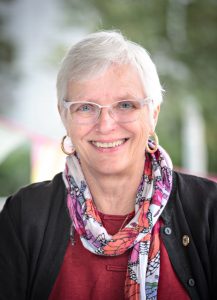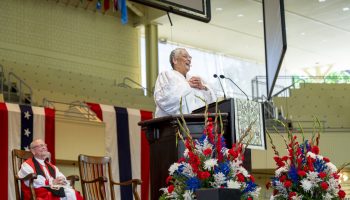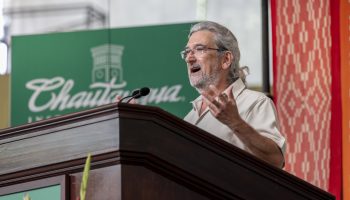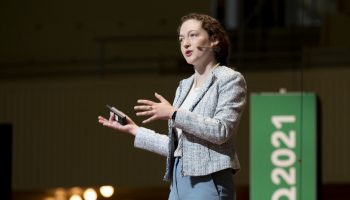
Go to a place of worship. Listen. Leave.
Go home. Do the dishes. Return next week.
Judith Lief, a Buddhist acharya, said it’s not fair to separate daily life from how a given religion describes spirituality.
“Life itself is a spiritual experience,” Lief said.
In her upcoming lecture “Human Longing and the Search for Meaning,” Lief hopes to raise questions on what it means to practice a religion and what it means to navigate spirituality outside of a religion. The lecture, to be broadcast at 2 p.m. EDT Tuesday, July 7, on the CHQ Assembly Video Platform, is part of Week Two’s Interfaith Lecture Series theme, “Forces that Shape Our Daily Lives: The Contemporary Search for Spirituality.” The lecture was recorded June 23, but upon its release, the audience can submit questions for the live Q-and-A at www.questions.chq.org or on Twitter with #CHQ2020.
Lief will focus on people who consider themselves to be spiritual while not aligned with a religion. Some call them “nones,” though Lief doesn’t quite agree with the term.
“I don’t think it’s intentional, but there’s a sense of dismissal, that the real ‘ones’ are religious and other people are less than that,” Lief said.
Spirituality can be part of a religion, but this group of people reach for the spiritual without the framework of a religion.
Lief said the roots of the two words, spirituality and religion, denote differences between the two. The spir in “spirituality” is shared with the word “inspiration,” for example — to inspire breath. This indicates that spirituality is as intimate as breathing.
The lig in “religion” is shared with “ligament,” which defines religiosity as tying or binding oneself to a particular path with more structure and a fixed set of values.
Religion and spirituality have both benefits and detriments. Lief said the “obvious drawbacks” of religion include tying patriarchy, bigotry and racism into that same set of values, while spirituality on its own can be “flaky.”
Whether a person has spir, lig, both or neither, “We’re just trying to figure out what we’re doing here,” Lief said.
Lief has found this in Buddhism, but she grew up Protestant with an ex-Catholic father. She found herself asking more questions about her faith in a congregation that was not deeply religious.
Even in this congregation, the religious hierarchy found her questions “threatening.”
“It was a strong message of, ‘This is the way it is and you shouldn’t ask questions, and you shouldn’t take it too seriously. We don’t really need it that much, it’s just kind of a cozy tradition we have,’” Lief said of the church’s response. “And I found that very frustrating. I’m sure they found me annoying.”
Disillusioned with organized religion while still seeking answers, Lief later studied at Lutheran College while not being affiliated with any religion herself.
While living in New York, she attended a talk by the person who would become her teacher and spiritual guide, Tibetan meditation master Ven. Chögyam Trungpa Rinpoche.
Though he was trained in the Tibetan Buddhist tradition of Chögyam, Rinpocha did not introduce himself as a Buddhist to his audience. Lief felt like he was just speaking the truth.
Later, meditation would deeply impact Lief, because it required sitting with questions (rather than reach for answers) and the raw uncertainty and immediacy of life. Lief felt the experience connected her with others.
“You can believe one thing, you can believe other things, but underneath it all, there is something very human, something very powerful and good that I thought I was reconnecting with,” Lief said. “That’s continued to be an important part of my life.”
In Buddhism, people can go through the formal process of becoming initiated into the faith, or not. While formally trained, Lief said she was told not to take the Buddhist label too seriously.
“Jesus was not a Christian. Buddha was not a Buddhist,” Lief said. “They were just people asking questions about life and trying to find answers. Later, churches and temples and organizations of all kinds developed, which have good qualities and not-so-good qualities.”
By raising important questions in her lecture, Lief hopes to impart what is important beyond institutions of religion.
“It’s not all about institutions, it’s what we do with them,” Lief said. “Being in a religion can be used to check out of things we don’t want to face. … Whatever we call ourselves, we’re humans.”
This program is made possible by the Deloras K. and L. Beaty Pemberton Lectureship.




